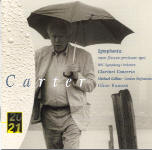Elliott Carter’s new orchestral work, Symphonia, has a Latin subtitle that translates as “I am the prize of flowing hope,” and is taken (as was the inspiration for the whole work) from the poem “Bubble”, by 17th-century poet Richard Crashaw. The subtitle is apt. Symphonia not only is an astonishing achievement for a composer of 90, it represents the very best in contemporary, post-tonal music, and demonstrates conclusively that greatness in music is not a matter of fashion or fad, but the result of individual composers using their personal musical language with a masterful awareness both of what they want to say and how to use their own vocabulary and syntax to say it. Cast in three ample sections, Symphonia is first and foremost music of tremendous expressive intensity. The first movement alternates several different kinds of music: hyperactive scurrying in the upper reaches of the orchestra on woodwinds, violins, and high percussion; a haunting threnody in slow tempo for strings, always punctuated with sharp interjections from the brass and woodwind; and passages of single notes or chords alternating with silence. The slow movement has a dark, elegiac cast, reminiscent in places of a funeral march, while the finale, one of Carter’s trademark scherzos, is all light and air, a brilliant musical fantasy that fizzes and “bubbles” like orchestral champagne.
The Clarinet Concerto further demonstrates the pinpoint accuracy with which Carter has mastered his richly complex musical vocabulary. Like all of his concertos, the piece embodies a very original take on the essentials of the form: the soloist is pitted against different instrumental groups, each with its own kind of music. These various encounters generate a prodigious amount of energy, and the result is real dialogue, action and reaction, between the soloist and the various members of the orchestra. Oliver Knussen, clarinetist Michael Collins, and the members of the various bands play both works with a level of comfort and mastery that overcomes the purely technical issues of getting the notes right and allows the music its maximum expressiveness. Carter’s music is difficult, but the effort is worth your time, and a superb recording such as this offers an ideal way to make the acquaintance of these two extraordinary masterpieces.
































